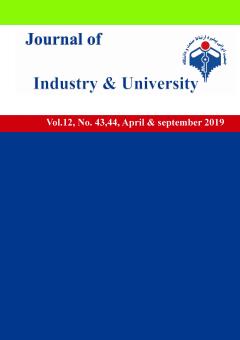Investigate the relationship between busy managers and earnings management with emphasis on the role of corporate governance at listed companies in Tehran Stock Exchange
Subject Areas : عمومىAmeneh Bazrafshan 1 * , Aynaz Khorasanian 2
1 -
2 -
Keywords: busy managers, earnings management, corporate governance, General policies of the system,
Abstract :
There are controversial views about the implications of the use of busy managers on the board. Therefore, the purpose of this research is to investigate the relationship between busy managers and earnings management with an emphasis on the role of corporate governance. The data required for this study included 90 companies that were accepted in Tehran Stock Exchange during the years 2011-2017. Results based on regression models show that busy managers have a negative and significant effect on real earnings management. In this way, employing busy managers on the board reduces the real earnings management and, consequently, increases the quality of earnings. However, there is not a meaningful relationship between the number of busy managers and accrual earnings management. In addition, the findings suggest that corporate governance does not have a significant effect on the relationship between busy managers with earnings management. In sum, the findings provide empirical evidence on overall employment policies
1. زارعی، بهروز و زارعی، عظیم. (1385). پارادایم های تئوریک تبیین کننده ارتباطات بین سازمانی، فصلنامه دانش مدیریت، دوره 20، شماره 78، صص 45-62.
2. صفرزاده، محمدحسین. (1393). نقش راهبری شرکتی در توضیح چسبندگی هزینهها، فصلنامه حسابداری مالی، جلد ۶، شماره ۲۳، صص ۱-۲۱.
3. صمدی، علی. (1395). بررسی تاثیر انگیزه¬ها و مشوق های هیئت مدیره و اعضای مشترک هیئت مدیره بر حق الزحمه حسابرسی، پایان نامه کارشناسی ارشد، دانشگاه امام رضا(ع).
4. فروغی، داریوش و شمسآبادی، جمال. (1396). تأثیر هیئتمدیره مشترک بر افشای اختیاری اطلاعات و کیفیت سود، پژوهشهای حسابداري مالي و حسابرسي، سال نهم، شماره 43، صص 16 – 43.
5. Ahn, S., Jiraporn, P., & Kim, Y. (2010). Multiple directorships and acquirer returns. Journal of Banking & Finance, 34(9), 2011–2026.
6. Brickley, J., Linck, J., & Coles, J. (1999). What happens to CEOs after they retire? New evidence on career concerns, horizon problems, and CEO incentives. Journal of Financial Economics, 52(3), 341–377.
7. Cashman, G. D., Gillan, S. L., & Jun, C. (2012). Going overboard? On busy directors and firm value. Journal of Banking & Finance, 36(12), 3248–3259.
8. Chen, Ch. Lin, J. Yi, B. (2008), Two Faces of Busy Outside Directors, Corporate Ownership & Control, Vol. 6 Issue. 2-4, 467-474.
9. Chiu, P.C., Teoh, S. H. &Tian, F. (2013), Board Interlocks and Earnings Management Contagion, The Accounting Review, forthcoming.
10. Connelly, B. L., Johnson, J. L, Thhanyi, L, & Ellstrand. A.E., (2011), More than adopters: Competing influences in the interlocking directorate. Organization science, 22(3), 688-703.
11. Dimaggio, P.J., & Powell, W.W. (1983). Institutional isomorphism and collective rationality in organizational fields.
12. Fama, E. F., & Jensen, M. C. (1983). Separation of ownership and control. The Journal of Law and Economics, 26(2), 301–325.
13. Faleye, O., Hoitash, R., & Hoitash, U. (2011). The costs of intense board monitoring. Journal of Financial Economics, 101(1), 160–181.
14. Ferris, S., Jagannathan, M., & Pritchard, A. (2003). Too busy to mind the business? Monitoring by directors with multiple board appointments. The Journal of Finance, 58(3), 1087–1111.
15.Fich, E., & Shivdasani, A. (2006). Are busy boards effective monitors? The Journal of Finance, 61(2), 689–724.
16.Harris, I. C., & Shimizu, K. (2004). Too busy to serve? An examination of the influence of overboarded directors. Journal Of Management Studies, 41(5), 775–798.
17.Hauser, R. (2018), Busy directors and firm performance: Evidence from mergers, Journal of Financial Economics, Vol. 128 Issue. 1, 16-37.
18.Hoitash, R., & Hoitash, U. (2009). The role of audit committees in managing relationships with external auditors after SOX: Evidence from the USA. Managerial Auditing Journal, 24(4), 368–397.
19.James, H.L. Wang, H. Xie, Y. (2018), Busy directors and firm performance: Does firm location matter? North American Journal of Economics and Finance, Vol. 45 Issue. 3, 1-37.
20.Jiraporn, P., Davidson, W. N., DaDalt, P., & Ning, Y. (2009). Too busy to show up? An analysis of directors absences. The Quarterly Review of Economics and Finance, 49(3), 1159–1171.
21. Laux, C., & Laux, V. (2009). Board committees, CEO compensation, and earnings management.The Accounting Review, 84(3), 869–891.
22.Levit, D., & Malenko, N. (2013). The labor market for directors and externalities in corporate governance. (SSRN working paper, viewed 28 January, 2014). http://ssrn.com/abstract=2101874
23.Lee, K. Lee, C (2014), Are MD Beneficial in East Asia, Accounting and Finance, Vol. 54 Issue. 3, 999-1032.
24.López-Iturriaga, F., & Morrós, I. (2014). Boards of directors and firm performance: The effect of multiple directorships. Spanish Journal of Finance and Accounting /Revista Española de Financiación y Contabilidad, 43(2), 177–192.
25. Masulis, R. W., & Mobbs, S. (2011). Are all inside directors the same? Evidence from the external directorship market. The Journal of Finance, 66(3), 823–872.
26.Mendez, C. Garcia, R. Pathan, Sh. (2017), Monitoring by busy and overlap directors: an examination of executive remuneration and financial reporting quality, Spanish Journal of Finance and Accounting, Vol. 46 Issue. 1, 28-62.
27.Oliver. C, (1991), Strategic Responses to Institutional Processes, The Academy of Management Review, Vol. 16, No. 1و 145-177.

